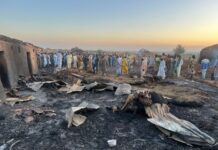 Published by cfr.org June 18, 2012
Published by cfr.org June 18, 2012
Women cry during a mass funeral for the victims of Christmas day bombing at St Theresa Catholic church, outside Nigeria’s capital Abuja February 1, 2012 (Afolabi Sotunde/Courtesy Reuters)
An apparently new jihadist group announced its establishment by video recently. Calling itself Jama’atu Ansarul Musilimina Fi Biladi Sudan, it states as its goal to protect Muslims in Africa.
There is speculation that this new group may be a splinter of one of the apparently numerous groups that are collectively identified as Boko Haram. At this stage, it is unclear how large or influential this new group might be or whether it presages a violent struggle among erstwhile parts of Boko Haram.
Christian rhetoric, led by the Christian Association of Nigeria (CAN), is also escalating. A CAN representative recently said that it is “ready to fight Boko Haram.” The press is reporting that “Christian groups” recently threatened to expel Muslim Fulanis from their neighborhoods. In another instance thirteen Fulanis were killed.
Meanwhile, the Borno Elders Forum June 14 called on President Goodluck Jonathan to greatly reduce the security presence in Maiduguri. At the same time, the Borno Elders appealed to Boko Haram to stop the fighting, which has “crippled all social and economic activities to the extent that people found it difficult to perform their five obligatory prayers in congregation.”
According to the press, the security services have been responsible for many deaths, and their seeming indiscriminate violence probably promotes popular support or acquiescence for Boko Haram. It is true that the majority of Boko Haram’s victims have been Muslims, though its claims of responsibility for attacks on Christians, highlighted by Sunday’s bombings in Kaduna and Zaria, are escalating. Under these circumstances, CAN’s rhetoric is understandable if unfortunate because it contributes to Nigerian religious polarization, especially in the North.
Culled from http://blogs.cfr.org/campbell/2012/06/18/violence-in-nigerias-north-taking-new-turns/



